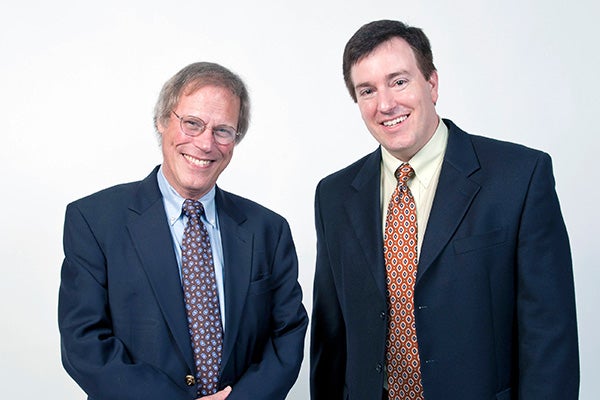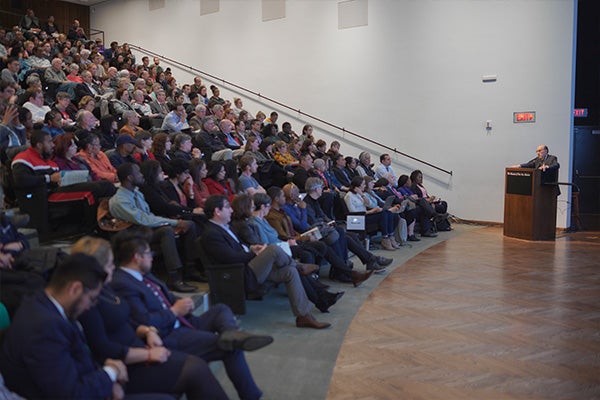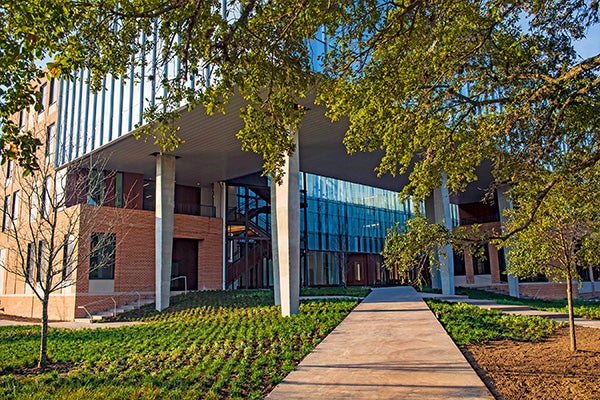The Kinder Institute for Urban Research can trace its origins back to the first iteration of the Houston Area Survey, conducted as a class project in March 1982.
Two months later, Houston’s oil boom collapses — almost 100,000 jobs are lost. Rice University professor Stephen L. Klineberg would decide to conduct the study again with a new class the following spring, and then each year after that, tracking the economic outlooks, demographic patterns, experiences and beliefs of area residents.
After nearly three decades of findings, the institute became a permanent home for the survey and a launch pad for new research initiatives aimed at improving lives in Houston and beyond.
2010-2015 | 2016-2020 | 2021-2025
2010

In February, Rice University launches the Institute for Urban Research with Stephen Klineberg and Michael Emerson as founding co-directors, combining the university’s Center on Race, Religion and Urban Life and the Urban Research Center. A Houston Chronicle editorial bills the institute as an “American mirror,” writing, “With the Institute for Urban Research, Houston could be one of the nation's new urban mentors in years ahead.”
In November, philanthropists Nancy and Rich Kinder endow the institute with a $15 million gift. In their honor, the organization is renamed the Kinder Institute for Urban Research, and the annual study became the Kinder Houston Area Survey.
Later that year, the Lilly Endowment Inc. increases its total funding to $4 million for the national Panel Study of American Religion and Ethnicity, a joint project with researchers at the University of Notre Dame. Later renamed the Portraits of American Life Study, Emerson and other Kinder Institute researchers would go on to publish several articles based on the panel’s insights.
2011
The Houston Education Research Consortium (HERC), led by founding director Ruth N. López Turley, is established with a $1.3 million grant from the Laura and John Arnold Foundation.
The institute launches Community Bridges, a program for Rice undergraduates offering coursework in urban sociology while pairing them with Houston nonprofits to conduct research on urban inequalities. The program begins with a focus on Houston’s Fifth Ward, partnering with the Small Steps Nurturing Center, the Fifth Ward Community Redevelopment Corporation, the Julia C. Hester House, the Pleasant Hill Leadership Institute and YES Prep Fifth Ward.
2012
The Kinder Houston Area Survey releases “Interesting Times,” a short film exploring the central findings from the first three decades of this research.
The institute publishes “The Houston Arts Survey: Participation, Perceptions & Prospects” exploring how residents value arts and entertainment and their contributions to quality of life in the city.
The Kinder Houston Area Survey findings are shared with a large public audience for the first time. Over 1,000 people gather at Discovery Green to hear the results of the survey.
2013
The Kinder Institute unveils the Houston Area Asian Survey, the first systematic look at the local Asian population based on three surveys conducted over a 16-year period — 1995, 2002 and 2011. The study explores demographics, life experiences and societal issues across the Houston area’s four largest Asian communities: the Vietnamese, Indian/Pakistani, Chinese/Taiwanese and Filipino populations.
The Arnold Foundation gives $1.8 million to continue supporting the Kinder Institute’s research efforts aimed at improving educational achievement at Houston ISD.
2014
The institute releases two major reports based on Kinder Houston Area Surveys — one tracking the region’s health disparities and another focused on Hispanic residents and their impact on Houston’s future.
William Fulton, author, urban planner and former mayor of Ventura, California, joins the institute in August as its new director.
2015

The Kinder Institute launches its signature Kinder Institute Forum lecture series, which brings well-known thought leaders in the study of urban issues to Houston.
The Urban Edge expands from a monthly newsletter into a daily blog, posting stories “about cities and what makes them great.” The publication rapidly grows its reach, expanding awareness of the Kinder Institute brand locally and nationally.
Houston Endowment and the Arnold Foundation collectively invest $2.2 million to support HERC’s partnership research with Houston ISD.
2016
The institute receives a multiyear, $7 million grant from Houston Endowment, supporting the institute’s data and outreach efforts as well as new research initiatives around urban disparity, development, transportation, placemaking and governance.
“The Houston Pension Question” explains how the city’s $3.9 billion unfunded pension liability developed and helps the city find sustainable solutions to the financial crisis.
With funding from six local and national foundations, HERC becomes the founding partner of the National Network of Education Research-Practice Partnerships.
2017
HERC receives a $10.7 million grant from the Kinder Foundation to expand its research partnerships with Houston-area school districts.
The institute unveils two public data tools: the Urban Data Platform, a repository of processed, research-ready data on the Houston area led by Kathy Ensor, and the interactive Houston Community Data Connections dashboard.
2018
HERC participates in an international study of children’s socio-emotional skills led by the Organization for Economic Cooperation and Development, with Houston as one of 11 sites around the world.
Led by Ensor alongside multiple community partners, the institute participates in the launch of the Hurricane Harvey Registry, which later becomes the Texas Flood Registry, ultimately collecting data from over 20,000 unique households about the impacts of flooding.
The institute adopts its brand promise, coined by Rose Rougeau: “Building better cities. Building better lives.”
2019
The institute becomes the strategic research partner for the Understanding Houston project initiated by the Greater Houston Community Foundation.
In April, researchers testify alongside other education experts to the Texas Senate's Committee for Education about the importance of all-day pre-K. Later, the governor signs House Bill 3, establishing full-day pre-K for eligible students.
2020

Klineberg’s book, “Prophetic City: Houston on the Cusp of a Changing America,” is published by Simon & Schuster. The institute moves into its new home, Kraft Hall.
The institute launches the Gulf Coast Coronavirus (COVID-19) Community Impact Survey, collecting data on the pandemic’s impacts on education, well-being and employment from over 12,000 Houston-area households.
The inaugural “State of Housing in Harris County and Houston” report is published, examining trends across dozens of indicators from 2010 to 2018 to begin creating a deeper understanding of Houston’s housing stock.
2021
The Kinder Houston Area Survey is conducted for its 40th year.
The Houston Education Research Consortium publishes 10 reports documenting the patterns of student mobility across the Houston area, empowering districts to understand where students go when they change districts and how to mitigate the impact of these moves. In a separate study, the consortium revealed the extent of the state’s challenges with long-term English learners.
The institute joins the George W. Bush Institute-SMU Economic Growth Initiative in Dallas and the LBJ School of Public Affairs Urban Lab at the University of Texas at Austin to publish the “Texas Metropolitan Blueprint: A Policy Agenda to Secure the Competitiveness and Prosperity of Texas.”
The institute leads a national survey of 100 city leaders to produce “A Bottom-Up Infrastructure Strategy for American Renewal,” which was shared with the Biden administration to guide conversations about federal infrastructure investments.
López Turley is announced as the next director of the Kinder Institute.
2022
The institute unveils the Greater Houston Community Panel with the 41st Kinder Houston Area Survey, establishing the survey infrastructure for conducting large-scale, longitudinal studies of Houston-area residents. The panel is made possible in partnership with UT Health Houston.
López Turley announces plans to expand the institute’s scope and to extend the research-practice partnership model she led with HERC to other areas of research. United Way of Greater Houston formally signs on as a research partner.
In September, the Kinder Foundation invests an additional $50 million to help the institute further its expansion efforts.
2023
The institute publishes an in-depth study of Houston parks and greenspace in collaboration with the Kinder Foundation, the Jacob and Terese Hershey Foundation and the Cullen Foundation.
HERC releases several key reports assessing HISD classrooms, services and programs as part of the Equity Project, along with a comprehensive study of college and workforce outcomes of Houston-area high school graduates.
2024
The institute embarks on a multiyear, multilingual study revisiting the Asian American community in the Houston metro area, which grew in population by 53% from 2010 to 2020.
Rice University announces its 10-year strategic plan, Momentous: Personalized Scale for Global Impact, with the Kinder Institute as a critical partner in its work to build thriving urban communities.
2025
The Greater Houston Community Panel expands to reach thousands of households in Fort Bend and Montgomery counties, forming a three-county representative panel for a region that is home to 1 in 5 Texans.
Physical Address
Rice University
Kraft Hall
6100 Main Street, Suite 305
Houston, TX 77005-1892
